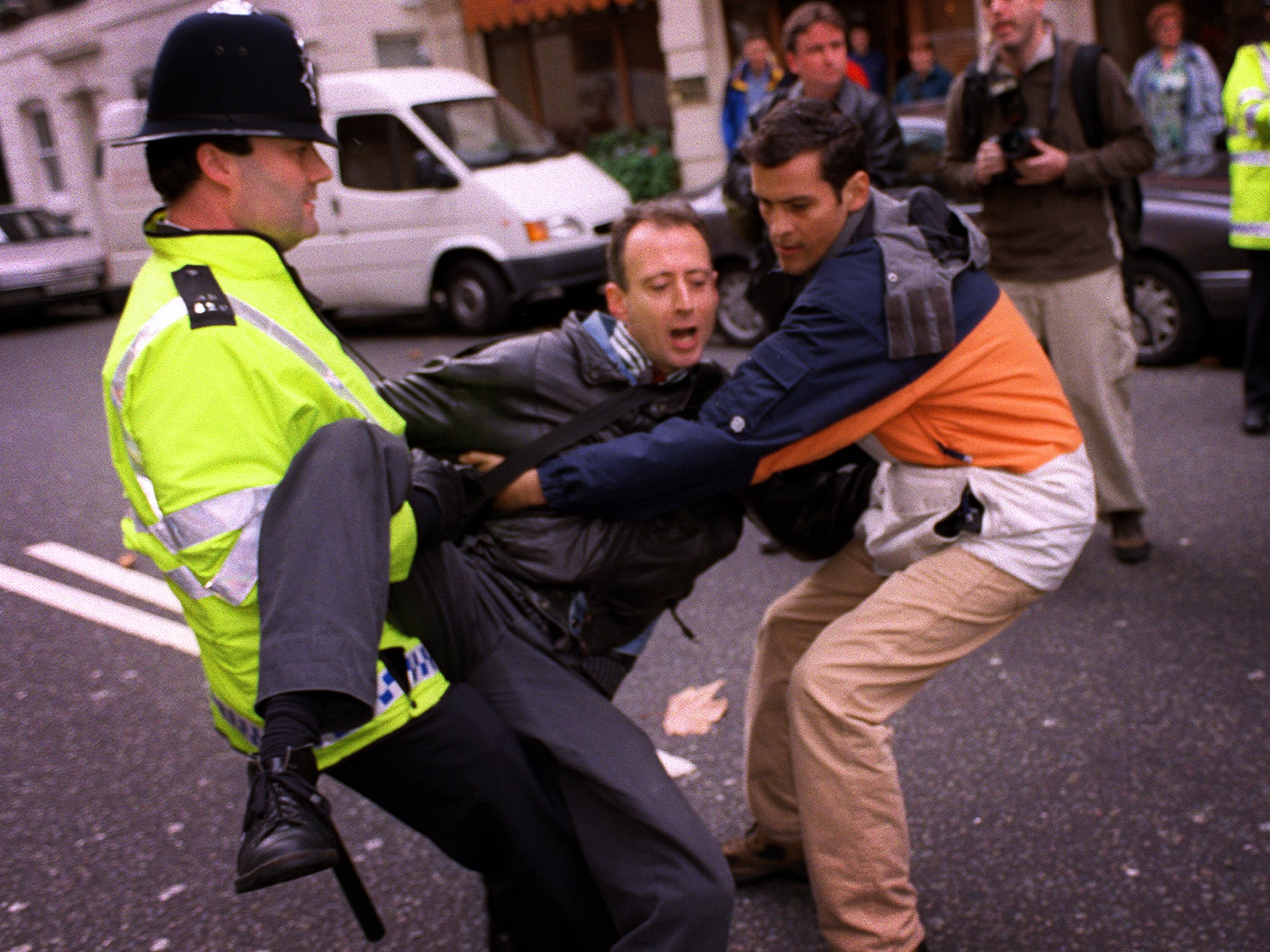How to make a citizen's arrest
The latest attempt to make a citizen's arrest on Tony Blair is saluted by campaigner Peter Tatchell, who was beaten unconscious in his attempt to apprehend President Mugabe


Your support helps us to tell the story
From reproductive rights to climate change to Big Tech, The Independent is on the ground when the story is developing. Whether it's investigating the financials of Elon Musk's pro-Trump PAC or producing our latest documentary, 'The A Word', which shines a light on the American women fighting for reproductive rights, we know how important it is to parse out the facts from the messaging.
At such a critical moment in US history, we need reporters on the ground. Your donation allows us to keep sending journalists to speak to both sides of the story.
The Independent is trusted by Americans across the entire political spectrum. And unlike many other quality news outlets, we choose not to lock Americans out of our reporting and analysis with paywalls. We believe quality journalism should be available to everyone, paid for by those who can afford it.
Your support makes all the difference.The attempt by Twiggy Garcia, a London bar worker, to arrest Tony Blair last week for crimes against peace in Iraq was a brave effort to bring to justice a former Prime Minister who many people regard as having got away with waging an illegal war.
This is the value of citizen's arrest powers: they grant ordinary people the right to arrest the bad guys when the forces of law and order fail to do so. Too often the rich and powerful use their influence to evade justice. The right of citizen's arrest gives the unrich and unpowerful the means to make sure they don't get away with it.
The citizen's arrest statute dates back to medieval England and common law. It is today enshrined in the Police and Criminal Evidence Act 1984. Every citizen has the right to perform an arrest if they have evidence that a person has committed a crime.
I used this power in my two attempted citizen's arrests of the Zimbabwean tyrant Robert Mugabe. I had evidence from Amnesty International that he had authorised the torture of Ray Choto and Mark Chavunduka, two journalists, in Harare. Torture is illegal under the UN Convention Against Torture and under Section 134 of the Criminal Justice Act 1988.
My first attempt was in London in 1999. Together with three colleagues from OutRage!, the queer rights group, I ran in front of Mugabe's limousine, forcing it to halt. I opened the rear door (amazingly it was unlocked) and physically arrested Mugabe on charges of torture. When the police arrived, they ignored the evidence of Mugabe's criminal acts. We were arrested, while he was given police escort to go Christmas shopping at Harrods.
Presumably, the then Metropolitan Police Commissioner and Attorney General were informed and they decided to allow Mugabe to return to Zimbabwe without facing any charges. In effect, they facilitated the continuation of his reign of terror and torture. On the opening day of our trial, all charges were dropped. I suspect because we had acted lawfully and the authorities did not want it tested in court. They feared that our possible acquittal might popularise citizen's arrests and give encouragement to others.
My second citizen's arrest bid was in 2001 in Brussels. When the Belgian government ignored my formal request to arrest Mugabe for torture, I ambushed him in the lobby of the Hilton Hotel. This time, I was beaten unconscious by his body guards in full view of the Belgian police and secret service agents.
Neither of my attempts to bring Mugabe to justice succeeded. But the worldwide media coverage did draw attention to his human-rights abuses and gave a moral boost to the people of Zimbabwe who thought, at the time, that the outside world neither knew nor cared about their suffering.
This is one of the great virtues of an attempted citizen's arrest. Even if it doesn't succeed, it can help publicise an injustice. It's a way of raising awareness.
Since the Mugabe bid, I've plotted similar attempts on George W Bush, Ariel Sharon and Tony Blair. Alas, the security ring was too tight. But others have had a go. In 2008, journalist George Monbiot tried to arrest John Bolton, the former US ambassador to the UN. Two years later, in Canada, there was an attempted citizen's arrest of George W Bush. Also in 2010, Ed Balls MP faced an arrest bid by Democracy Village peace protesters for his support of the invasion and occupation of Iraq.
Citizen's arrests are about citizen's power. They are an essential element of a democratic judicial system. Long may they continue.
Peter Tatchell is director of the human rights lobby the Peter Tatchell Foundation: www.PeterTatchellFoundation.org